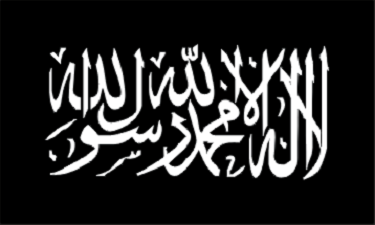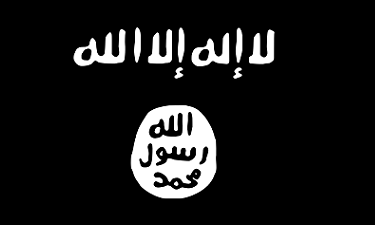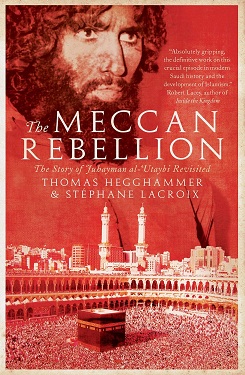Inscription on the flag of the Mahdi’s army?
Tuesday, April 30th, 2013[ by Charles Cameron — how to tell an authentic Mahdist “black banner” — from a false flag, perhaps? ]
.
There has been considerable talk about black flags featuring the Shahada:
This is the creed of Islam, and reads, “There is not God but God, and Muhammad is the Prophet of Allah.”
And more recently, of black flags featuring the seal of Muhammad:
When the ISI adopted the flag, it issued a statement in 2007 explaining its design. In the statement, the group relates oral traditions portraying Mohammad’s battle flag as either black or white (other traditions say yellow) with the words “No god but God, Mohammad is the messenger of God” written on it. The ISI chose black for its flag because most accounts say the Prophet’s flag was black, and chose the Muslim testimony of faith because many accounts said it was written on the Prophet’s flag.
For the second half of the testimony of faith, “Mohammad is the messenger of God,” the ISI reproduces the Prophet’s seal. They contend that the seal’s design is preserved in Ottoman manuscripts and its three-lined text, “God/Messenger/Mohammad,” is mentioned in oral traditions about the Prophet. They have added this seal to their flag, they explain, because some Muslim scholars say that it appeared on the Prophet’s flag.
**
I therefore thought it worth noting that al-Islam.org — which presents Islam “with particular emphasis on Twelver Shia Islamic school of thought” — has a section on The Slogan on the Flag of the Uprising in Chapter 7, The Uprising of the Imam of the Time (‘atfs) of Najmuddin Tabasi‘s An Overview of the Mahdi’s (‘atfs) Government, which reads:
Every government has a flag by which it can be recognized, and uprisings and revolutions also have particular flags whose logos bespeak of the objectives of their leaders. The global revolution of Hadrat al-Mahdi (‘a) has also a specific flag on which a slogan has been inscribed. Of course, although there are differences with respect to the slogan on his flag, there is a common point in all the statements and that is: It invites the people to obey him (‘a).
Now, it would suffice to mention some pertinent instances:
It has been recorded in a hadith: “It is thus written on the flag of Hadrat al-Mahdi (‘atfs): ‘Listen and obey him’.”
Elsewhere, we read: “The slogan of al-Mahdi’s (‘atfs) flag is al-bay‘atu lillah (the allegiance for the sake of Allah).”
**
Just a little different, eh?
Well, that’s it — just a footnote to ponder.








